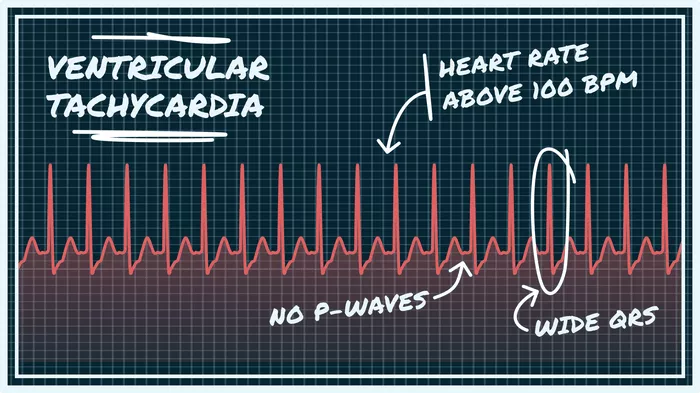Ventricular tachycardia (VTach) is a serious cardiac arrhythmia that can have life-threatening consequences if not promptly treated. This condition involves rapid and abnormal electrical signals originating in the lower chambers of the heart, known as the ventricles. In this article, we will explore why VTach is dangerous, its causes, symptoms, diagnosis, treatment options, and potential complications.
Understanding Ventricular Tachycardia (VTach)
Ventricular tachycardia is characterized by a rapid heart rate exceeding 100 beats per minute, originating from the ventricles instead of the heart’s normal pacemaker, the sinoatrial (SA) node. This abnormal rhythm can disrupt the heart’s ability to pump blood effectively, leading to serious health risks.
Causes of VTach
There are several potential causes and risk factors for ventricular tachycardia, including:
1. Structural Heart Disease: Conditions such as coronary artery disease, cardiomyopathy, heart failure, and previous heart attacks can increase the risk of VTach.
2. Electrolyte Imbalances: Abnormal levels of potassium, sodium, calcium, or magnesium in the blood can disrupt the heart’s electrical activity and trigger VTach.
3. Scar Tissue: Scarring from previous heart surgeries or heart attacks can create abnormal electrical pathways in the heart, contributing to VTach.
4. Genetic Factors: Inherited conditions such as long QT syndrome, Brugada syndrome, and arrhythmogenic right ventricular dysplasia (ARVD) can predispose individuals to VTach.
5. Medication Side Effects: Certain medications, especially those that affect the heart’s electrical conduction system, can increase the risk of developing VTach.
Symptoms of VTach
The symptoms of ventricular tachycardia can vary depending on the duration and severity of the arrhythmia. Common symptoms may include:
- Palpitations or rapid heartbeat
- Chest discomfort or pain
- Shortness of breath
- Dizziness or lightheadedness
- Fainting (syncope)
- Cardiac arrest in severe cases
It’s important to note that some individuals with VTach may not experience any noticeable symptoms, especially if the arrhythmia is brief or intermittent.
Diagnosis of VTach
Diagnosing ventricular tachycardia typically involves a combination of medical history review, physical examination, and diagnostic tests, including:
1. Electrocardiogram (ECG or EKG): This test records the heart’s electrical activity and can identify abnormal rhythms such as VTach.
2. Holter Monitor: A portable ECG device worn for 24 to 48 hours to monitor heart rhythms continuously and capture any episodes of VTach.
3. Event Recorder: Similar to a Holter monitor but used for longer periods to record heart rhythms during specific symptoms or activities.
4. Echocardiogram: An ultrasound of the heart to evaluate its structure, function, and any underlying heart conditions.
5. Electrophysiology Study (EPS): A minimally invasive procedure to map the heart’s electrical pathways and identify the origin of abnormal rhythms like VTach.
Treatment Options for VTach
The management of ventricular tachycardia aims to control symptoms, prevent complications, and reduce the risk of sudden cardiac arrest. Treatment options may include:
1. Medications: Antiarrhythmic drugs such as amiodarone, lidocaine, or beta-blockers may be prescribed to stabilize heart rhythms and prevent VTach episodes.
2. Cardioversion: A procedure to restore normal heart rhythm using electrical shocks or medications.
3. Implantable Cardioverter-Defibrillator (ICD): A device implanted under the skin that monitors heart rhythms and delivers electrical shocks if VTach or ventricular fibrillation (VFib) occurs.
4. Catheter Ablation: A minimally invasive procedure to destroy abnormal heart tissue responsible for VTach using radiofrequency energy or cryotherapy.
5. Lifestyle Modifications: Managing underlying conditions such as hypertension, diabetes, and maintaining a healthy lifestyle with regular exercise, balanced diet, and avoiding triggers like excessive alcohol or caffeine.
Potential Complications of VTach
Ventricular tachycardia can lead to serious complications if not properly managed, including:
1. Ventricular Fibrillation (VFib): A rapid and chaotic heart rhythm that can cause sudden cardiac arrest and death if not treated immediately with defibrillation.
2. Heart Failure: Prolonged episodes of VTach can impair the heart’s pumping function, leading to heart failure over time.
3. Stroke: Blood clots may form in the heart during VTach, increasing the risk of stroke if the clot travels to the brain.
4. Sudden Cardiac Death: In severe cases, untreated VTach can result in sudden cardiac death due to inadequate blood flow to vital organs.
Conclusion
In conclusion, ventricular tachycardia is a dangerous cardiac arrhythmia that requires prompt diagnosis and appropriate management to prevent serious complications. Understanding the causes, symptoms, diagnosis, treatment options, and potential risks associated with VTach is crucial for patients, healthcare providers, and caregivers in ensuring optimal cardiac health and reducing the risk of adverse outcomes. If you or someone you know experiences symptoms suggestive of VTach, seek immediate medical attention for proper evaluation and treatment.

